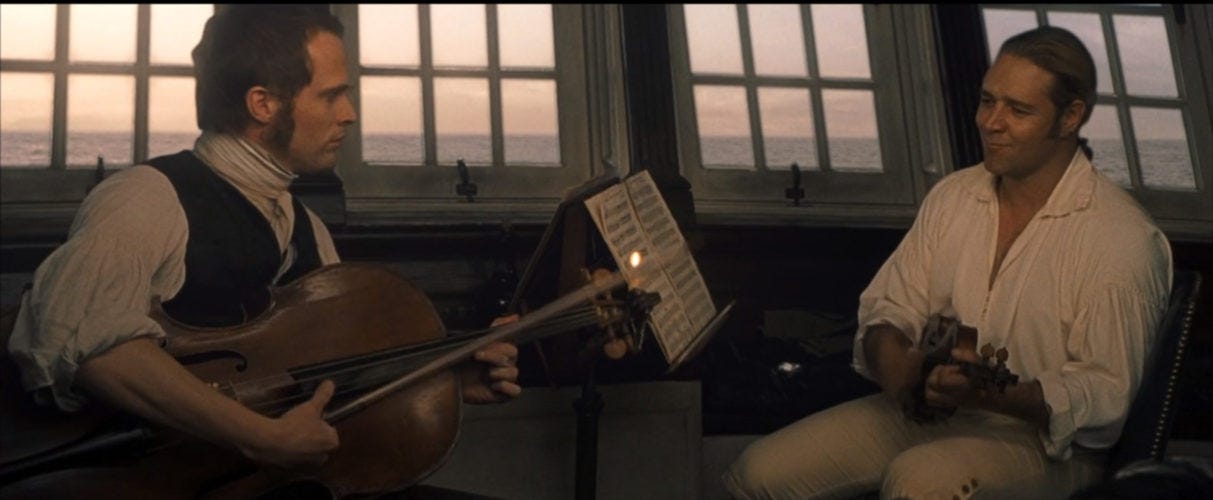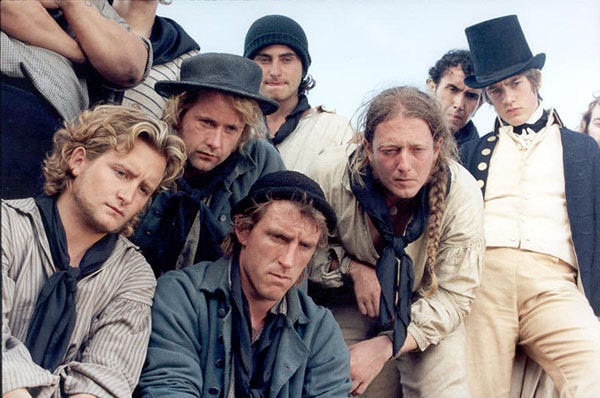April 1805. Napoleon is now master of Europe. Only the British fleet stands before him. Oceans are now battlefields. What does that mean? Dudes. Dudes being bros. Dudes shooting cannons. Dudes getting lashed, dudes eating weevils, dudes looking for new bugs. Dudes hacking off other dudes' limbs. Dudes duding all over the place. Dudes, in short, rocking. That's right: it's time for the most Dudes Rock movie of them all, "Master and Commander: The Far Side of the World." One of my favorite films.
Like "Shawshank," "M&C" is a masterpiece that didn't make a big splash but endured nevertheless, kept afloat by rabid cultists. To quote Lizzo, "I just took a DNA test, turns out I'm 100% that bitch." "M&C" is 100% that film. It's both comfy and bracing, like Heisenberg meth wrapped in a hot face-towel.
The film's set on the H.M.S. Surprise. It features Captain "Lucky Jack" Aubrey, who is portrayed by Peak Russell Crowe in golden retriever mode. Aubrey's mission: capture the French ship Acheron, a fast and powerful privateer. With him are 200 sailors. And, oh yes, Aubrey's best friend and debate antagonist: the ship's doctor Stephen Maturin (Paul Bettany) a Darwin-style naturalist who is essentially a cat in man-shape. Their emotional bond defines the film.
They represent the duality of human experience: we are animals who occasionally think. The adoration between them is expressed through argument, confidences, and recurring string-instrument duos that somehow feel more intimate than anything in a romcom. When Dr. Maturin operates on himself, and Jack cannot bear to look directly at his wound, and Maturin (in agonizing pain) laughs at his friend for his queasiness, it says more than any speech could.
Why does "M&C" have such staying power? After all, it's a thoughtful period piece set on a floating wooden fortress. No romances. Few emotional arcs. The action scenes are intense yet short. But I could watch this film a thousand times.
The simplest answer: "M&C" is competence porn. There is a profound pleasure in watching skilled professionals work, and this film immerses us into a world of first-rate technicians executing their duties. Or as Mr. Slade puts it, watching Maturin operate on an old man's skull: "Physician, he is. Ain't one of your common surgeons."
"M&C" also treats its crew, their beliefs, and their lives with respect, down to the youngest midshipman. There's no patronizing of the audience, either; just zero Hollywood bullshit. Even the surprise ending is faced with wry bemusement: duty goes ever on.
But fundamentally, "M&C" hits home because it understands that fellowship and mission are more crucial to happiness than material comfort. These men, huddled together in cramped quarters, know how much they owe to one another, because the sea wants them all dead. The film's emotional intelligence is its sneakiest part. The big action scenes obscure the deeper reality here: "M&C" is essentially a slice-of-life movie set in a beautiful wooden prison. We are watching village relationships. And while it's not a radical film, it is quietly subversive. It offers something that everyone hungers for: solidarity, meaning, and emotional intimacy. In other words, these men have what Frodo and Sam have on the cracks of Mt. Doom. That's filmmanship, Mr. Pullings. My God, that's filmmanship.




That's blogsmanship, Mr. Rhode. My God, that's blogsmanship!